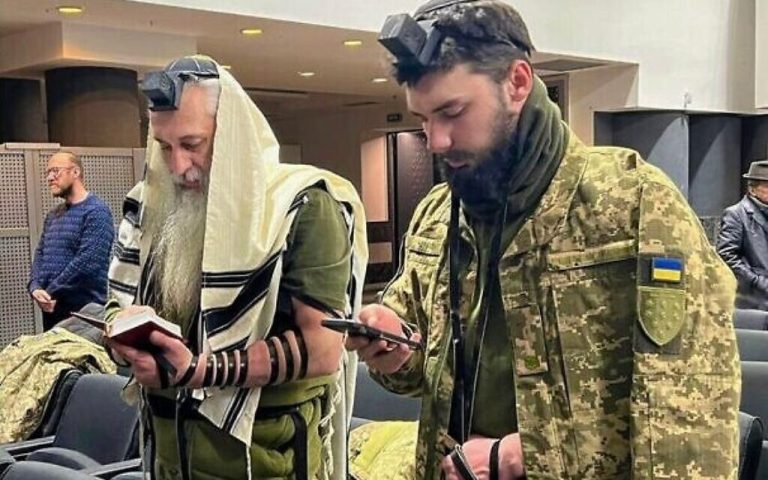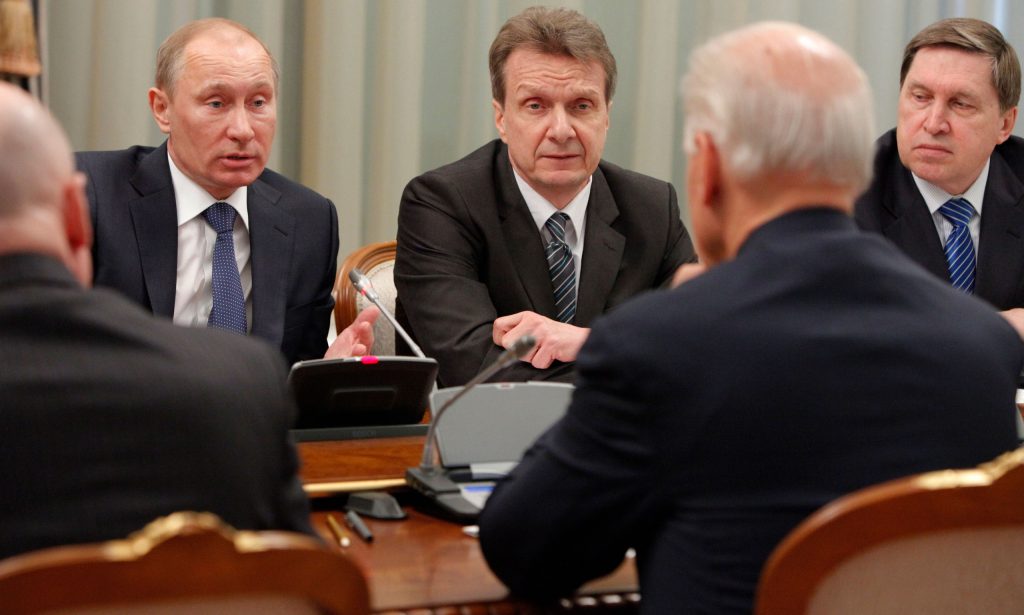A recent story about the alleged looting and attacks on Jewish community members in Zhytomyr in the wake of their attempts to leave the country for Israel was quickly debunked by the local Chabad chapter, but not before making the rounds on social media and in Jewish activist circles. In the case of Zhytomyr, the disinformation targeted a local Jewish NGO which facilitates the escape of the Jewish community members through Romania to Israel. Fact checking by Chabad afterwards revealed that there were no multiple victims of alleged looting, attacks, and harassment. The entire scenario was a fabrication. But this is not the first time Russian propaganda machinery has targeted the Jewish community with fictitious accounts of Ukrainian street brutality or the government’s alleged failure to protect them.
Stories alleging widespread acts of vandalism in Jewish cemeteries, false flag operations, and rumors about the growing right-wing extremism in Ukraine have been proliferating since at least 2014, when Russia had illegally invaded and annexed Crimea, while supporting a separatist movement in Donetsk and Luhansk. These stories helped set the stage for the current invasion, justifying the “denazification” campaign, one of the euphemism for the invasion which had materialized when Putin’s claims that the invasion was a response to NATO was debunked. This build up was similar to a concurrent running disinformation campaign about the alleged genocide against ethnic Russians being committed by Ukrainians, a campaign that has been ongoing in various forms since Putin first took office.
One of the biggest campaigns targeting the Jewish communities around the world with emotionally appealing messaging is the claim about the allegedly “Nazi” Azov Battalion supposedly spreading right-wing extremism and enjoying the support of the Ukrainian government and a Jewish billionaire. The truth is far more complicated. The Azov Battalion was founded as a militia that became a part of Ukraine’s National Guard as a response to the Russian aggression & separatism in Mariupol and other areas. The overwhelming majority included Ukrainians of all backgrounds, such as leftists, anarchists, and liberals.
The militia, later the battalion, did not have a formal official ideology other than to fight Russians; they became known for their high effectiveness in the field. Some years later, the Battalion was incorporated into the military as a Regiment, formalized and restructured. Its founders left to join extreme right-wing parties, which now form part of a fringe block, while the regiment itself was depoliticized and took steps to remove the roots of any lingering objectionable ideology, earning back its right to train with the US forces and the approval of the Ukrainian Jewish community. It became known for its successes in reconnaissance and counterreconnaisance, and is now a successful Special Operations unit. Yet despite all these changes, Russia continues to recycle old stories from 8 years ago, in turn reinforcing Western media narratives, reach rely largely on the most sensationalist claims. None of the recent stories about the Battalion bothered updating the information presented to the readers included information about the steps taken to remove any trace of extremism from this now regular military unit. It continues to be referred as a militia and treated as an outlier, which helps drive home the narrative about its alleged pro-Nazi proclivities and widespread social support not just of its military accomplishments but its alleged ideology.
Feeding into this campaign is the mindset of American Jews, many of whom are grandchildren of Holocaust survivors or of generations who had survived pogroms and street antisemitism in Ukraine. Carrying generational trauma from the stories told by their families, this subset of the American Jewish population has never independently traveled to Ukraine in recent years and has not had either an opportunity or an openness to observing the changes, many of which had been driven by the government, including steps to promote Holocaust education, no tolerance policy to hate crimes, and warm relations with the local Jewish communities and with Israel. There is little direct engagement between average American Jews not involved in Jewish organizational structures at a high level and Ukraine’s Jewish community. Russian propagandists play on this disconnect to build up an anti-Ukraine sentiment and to counter the natural sympathy of most Westerns with the plight of Ukrainians after the invasion.
But the Jewish community even in the United States is only a small segment of the population. Why is Russia so interested in winning their hearts and minds through these cheap shots and emotional manipulation?
The most obvious underlying reason for all of this is antisemitism. On the one hand, Russia continues to operate on the basis of old conspiracy theories postulating that Jews control governments in countries they live in or that at the very least, the Jewish lobbyists are incredibly powerful and have an outsized influence on the foreign policies of Western countries, such as the United States. The Protocols of the Elders of Ziyon, the ultimate antisemitic forgery and conspiracy theory was formulated in Tzarist Russia by the “Okhrana” (the secret police). There is a continuity of cultural antisemitism that migrated into the early Soviet Cheka/NKVD, the predecessor to KGB/FSB. KGB has brought the Protocols of the Elders of Zion , and other conspiracy theories to the Middle East, using it to introduce hatred against Jews and Israel among various liberation movements in the 1960s. These methods are not new to the current events. Likewise, anti-Zionism and ethnic antisemitism were prevalent as the State policies and ideologies in the Soviet Union and other Communist states.
Whether or not Putin, who fostered the Stasi chapter in Berlin as an intelligence officer, personally believes these ideas is beside the point. He clearly is keen on employing these methods to control the messaging and to achieve his geopolitical aims. He has surrounded himself with hardcore imperialist ideologues such as Alexander Dugin who espouse Stalinist ideals. And he relies on the unreformed FSB and GRU operatives to carry out the ideological and information warfare missions around the world, using the Soviet playbook in everything from overt propaganda to more sophisticated active measures. There are several identifiable target audiences in the attacks on Ukraine over the Jewish issue. The first is the aforementioned Western Jewish communities and lobbyists who might be turned into useful dupes and could be counted on to change public opinion and make both the US lawmakers and the wider audiences less sympathetic to Ukraine.
The secondary audience consists of Jewish billionaires and oligarchs in various countries. The concern over the effect of the recently imposed international sanctions may cause them to turn against Putin. The uptick in this propaganda is meant to appeal to their heritage and sentimentality, and to remind them that the war was inevitable, moral, and done for the right reasons. Many of the Russian Jewish oligarchs in particular are generous donors to various Jewish causes and to Israel. While Putin has threatened and commandeered many of the businessmen and oligarchs around Russia, particularly those with the ties to the defense sector, he has been trying not to alienate the Jewish billionaires, but rather to balance this approach to portray himself as a defender of Jewish interests. This has also been tied to courting the support of segments of the populist-minded conservative and Evangelical communities in the United States, which would normally have nothing in common with the Russian Orthodox Church or with a former KGB agent, a relic of an atheist Communist state these very same people and their families once stalwartly opposed.
Another audience Putin is targeting is the government of Israel which has been split on the issue of pursuing any level of strategic depth in relations with Russia in general, and on the appropriate level of support for Ukraine specifically, given that both countries have diplomatic relations with Israel, host significant Jewish communities, and Ukraine currently has a Jewish president in power. On the other hand, there are divergent security concerns, and at the end of the day, Russia is not a democracy or a trustworthy partner given its links to Iran among other problematic actors.
Finally, Russia is appealing to the left-leaning portions of Western countries, particularly politically active youth and the media, which has prioritized concerns over white supremacism in the West, often to the exclusion of threats from left-wing and religious/Islamist extremism. These particular outlets and activists have been also opposed to Putin for his apparent intolerance to sexual minorities in particular. Putin is trying to distract from the bad optics by focusing on a favored Nazi boogeyman in the “underdog” state that the press and the young generations tend to sympathize and identify with.
All of these campaigns work the same way: by feeding sensationalist, emotionally triggering stories that are difficult or impossible to verify, and recycling outdated stories that fit the narrative. The professional Russian propagandists rely on the unreliablility of fact checkers and the laziness of journalists which would prevent a thorough investigation of these claims. The irony here is that Putin, in 2011, became a signatory to the OSCE, which has found that Ukraine provides an adequate protection to the rights of its Jewish minority. If Ukraine is run by “fascists” and “Nazis”, as Putin and his officials have described the Zelensky government, why did he sign on to a lie to which Russia is formally beholden? This also raises questions about the role of Russia in the OSCE in general, since the OSCE also allows all of its members to freely choose their defense blocks and alliances, including NATO membership, and Putin has expressed no concern over Ukraine’s and Georgia’s pursuit of that alliance upon joining the OSCE. His positions attacking the two countries for a potential interest in NATO as a security threat to Russia belie Russia’s formal position on that issue as a member of an international organization.
All of these contradictions follow the old Soviet pattern of speaking from both sides of the mouth and providing political support to seemingly divergent and disparate groups, movements, factions, and interests. However, the underlying factor here, is an anti-Jewish policy from the classing KGB operational theory which manifests itself as simultaneous pursuit of antisemitic ideologies at top level and antisemitic messaging in pop culture, such as movies and TV shows, while projecting the hyperbolized version of the same on the adversary and actively deceiving and manipulating different groups susceptible to a skeptical or uninformed view of Ukraine and the current status of the Jewish community, which is flourishing throughout the country, with active synagogues, Jewish schools, newly built kosher stores, cultural activities, and exchanges with other communities around the world. All of the Jewish community members are free to leave at any time; the government does not compel them to recite propaganda or to praise its efforts. Many feel closely connected to Ukraine as a country, and despite having the option to flee, have chosen to remain even at the height of the invasion.
Post Author
Author
-

Irina Tsukerman is a US national security and human rights lawyer, geopolitical analyst, Fellow at the Jerusalem Center for Public Affairs and at Arabian Peninsula Institute, and President of Scarab Rising Inc, a security and geopolitical risk strategic advisory, the United States.
View all posts





